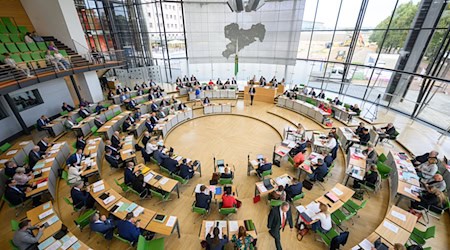The Greens in the Saxon state parliament are not letting up on the subject of the Interstate Broadcasting Treaty and continue to insist on clarification. The background to this is the government's answers to minor questions from MP Claudia Maicher (Greens). "In its response, the state government pretends that everything is still open. However, I have the impression that it is deliberately working to make the treaty fail."
Maicher had asked, among other things, when Prime Minister Michael Kretschmer (CDU) would have to sign the amendment to the Interstate Broadcasting Treaty at the latest and when it would have to be introduced as a bill in the state parliament in order to be passed on time.
In its response, the State Chancellery pointed out that Bavaria and Saxony-Anhalt have not yet signed the treaty, as the constitutional complaints by the broadcasters are still pending and a decision by the Federal Constitutional Court in the relevant proceedings is still outstanding. As long as the treaty has not been signed in full by all participating states, it cannot be forwarded to the Saxon state parliament for legal reasons.
Greens: The public must know the state government's position
"Hiding behind Bavaria and Saxony-Anhalt and legal reasons is misleading. The public needs to know what the state government's position is, how the state treaty will now proceed or whether it has already buried it," countered Maicher.
For the Green politician, it is unclear whether the state treaty will still be put to a vote in the Saxon state parliament. Now there is hardly any time left for a parliamentary procedure, she emphasized. If Kretschmer did not sign the treaty himself, this would also be unworthy of his current office as Chairman of the Conference of Minister Presidents. Maicher submitted another minor question on the topic.
Greens politician accuses government of "contribution populism"
"The state government has obviously not given any thought to the consequences of a failure of the treaty, otherwise it would not be completely avoiding the issue," Maicher concluded. The blockade attitude was causing public broadcasting as an important pillar for stabilizing democracy as a whole to falter. Necessary reforms could only succeed with financial planning security. Meanwhile, the state government is continuing its "contribution populism" regardless of losses.
The Interstate Broadcasting Financing Amendment Treaty is intended to prevent individual states from being able to single-handedly block the adjustment of the broadcasting contribution from 2027 by means of the so-called objection model. With this model, the approval of all 16 state parliaments will no longer be necessary in future. The draft would have to be passed by all state parliaments by November 2025, otherwise it will expire and cannot come into force.
Copyright 2025, dpa (www.dpa.de). All rights reserved










